| Article ID | Journal | Published Year | Pages | File Type |
|---|---|---|---|---|
| 2846472 | Physiology & Behavior | 2006 | 6 Pages |
Chronically enforced rapid eye (paradoxical) movement sleep deprivation (REM-SD) of rats leads to a host of pathologies, of which hyperphagia and loss of body weight are among the most readily observed. In recent years, the etiology of many REM-SD-associated pathologies have been elucidated, but one unexplored area is whether age affects outcomes. In this study, male Sprague-Dawley rats at 2, 6, and 12 months of age were REM sleep-deprived with the platform (flowerpot) method for 10–12 days. Two-month-old rats resided on 7-cm platforms, while 10-cm platforms were used for 6- and 12-month-old rats; rats on 15-cm platforms served as tank controls (TCs). Daily changes in food consumption (g/kg0.67) and body weight (g) during baseline, REM-SD or TCs, and post-experiment recovery in home cages were determined. Compared to TCs, REM-SD resulted in higher food intake and decreases in body weight. When returned to home cages, food intake rapidly declined to baseline levels. Of primary interest was that rates of body weight gain during recovery differed between the age groups. Two-month-old rats rapidly restored body weight to pre-REM-SD mass within 5 days; 6-month-old rats were extrapolated by linear regression to have taken about 10 days, and for 12-month-old rats, the estimate was about 35 days. The observation that restoration of body weight following its loss during REM-SD may be age-dependent is in general agreement with the literature on aging effects on how mammals respond to stress.
